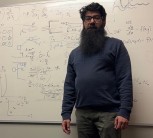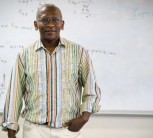Two University of Pretoria (UP) researchers have been awarded the 2025 Breakthrough Prize in Fundamental Physics, along with colleagues from the European Organisation for Nuclear Research (CERN), for their contribution to the ATLAS experiment. The general-purpose particle physics experiment seeks to exploit the full discovery potential of CERN’s Large Hadron Collider near Geneva. The collider is the world’s largest and most powerful particle accelerator, propelling protons or ions to near light speed.
Professor Lerothodi Leeuw, the recently appointed Head of UP’s Department of Physics in the Faculty of Natural and Agricultural Sciences, and Prof Muaaz Bhamjee of the Department of Mechanical and Aeronautical Engineering in the Faculty of Engineering, Built Environment and Information Technology (EBIT) are both principal investigators in the SA-ATLAS experiment. The SA-ATLAS group is one of four groups within the broader SA-CERN programme, and its members are active collaborators and users of CERN’s facilities in Geneva.
“To be part of research and an international team searching for currently unknown particles that constitute dark matter and the related new physics, as well as being involved in the upgrade of equipment to do so, is phenomenal – not to mention the recognition in the 2025 Breakthrough Prize in Fundamental Physics,” Prof Leeuw said.
The UP scientists’ roles in the experiment include searching for particles that constitute dark matter in exotic Higgs decay analyses; these investigations are at the frontier of new fundamental physics, beyond the Standard Model of particle physics. They are also involved in thermoflow and computational fluid dynamics analyses (of particular interest in the field of clean energy) to upgrade the ATLAS detector, the largest detector ever constructed for a particle collider. It is designed to record the high-energy particle collisions of the Large Hadron Collider, which occur at a rate of more than a billion interactions per second in the centre of the detector. The collider consists of a 27km ring of superconducting magnets with several accelerating structures to boost the energy of the particles.
Prof Bhamjee, who has been appointed as UP’s institutional representative of the initiative, explains that the ATLAS experiment is a collaboration of physicists, engineers, scientists, technicians, students and support staff from around the world.
“It is one of the largest collaborative efforts ever attempted in science, with over 5 500 members and almost 3 000 scientific authors,” he says. “Its success relies on the close collaboration of research teams located at CERN, and at member universities and laboratories worldwide.”
South African researchers joined the ATLAS collaboration in 2010 as a clustered institution, which included the University of Johannesburg, the University of KwaZulu-Natal, the University of the Witwatersrand and the University of Cape Town. UP is the ninth, most recent member of the cluster. The SA-CERN programme is hosted by iThemba LABS, South Africa’s national facility for accelerator-based sciences, on behalf of the National Research Foundation. It interacts with science policymakers, funding agencies and the community to develop high-energy physics and accelerator-based research, with a view to developing excellence in science, human capacity development, outreach and innovation.
Dean of the Faculty of Engineering, Built Environment and IT, Prof Wynand Steyn views UP’s participation in the SA-ATLAS experiment as a unique opportunity for interdisciplinary collaboration, allowing researchers to engage in cutting-edge advancements in high-energy physics and engineering. He believes this initiative empowers researchers to leverage their expertise, enhancing the University’s reputation and fostering innovation. It showcases South African talent globally while strengthening local partnerships, ultimately positioning UP as a key player in advancing scientific knowledge and contributing to the development of future scientists and engineers.
“This project is exciting for several reasons,” said Prof Barend Erasmus, Dean of the Faculty of Natural and Agricultural Sciences. “The level and impact of the work is, of course, important, but for me, the fact that we play on this global stage as two collaborating faculties from UP is the cherry on the cake. Imagine what else we can achieve by leveraging the collective expertise of these faculties.”
Prof Bhamjee said that UP’s inclusion in the SA-ATLAS experiment will strengthen South Africa’s contribution to ATLAS and CERN through expanded institutional capacity and transdisciplinary collaboration. By partnering with existing SA-ATLAS institutions, UP aims to support national efforts in building excellence in high-energy physics and engineering, fostering innovation and advancing global scientific goals.
“It represents an exciting step for UP, enabling its researchers to contribute to impactful, transdisciplinary science around the world, while strengthening local collaborations and showcasing African talent on a global scale,” Prof Bhamjee said.
Prof Muaaz Bhamjee and Prof Lerothodi Leeuw
October 29, 2025

Professor Muaaz Bhamjee is an Associate Professor in the Department of Mechanical and Aeronautical Engineering at the University of Pretoria. His research spans computational and experimental fluid dynamics, heat and mass transfer, high-performance computing, renewable energy, and data-driven and deep learning approaches to climate modelling. His current work focuses on machine learning and hybrid quantum computing approaches to fluid dynamics, high energy physics, and dynamical systems.
He serves as the University of Pretoria’s ATLAS CERN Institutional Representative and Vice-President of the South African Association for Theoretical and Applied Mechanics (SAAM) and the South African National Committee for IUTAM.
He has published over 200 accredited papers, with a Scopus h-index of 25 and a Google Scholar h-index of 56. Professor Bhamjee is a registered Professional Engineer with ECSA and a full member of SAIMechE. His prior experience includes roles at IBM Research – Africa, the University of Johannesburg, and Hatch Africa.

Professor Lerothodi Leeuw joined the University of Pretoria on the 1st September 2025, as Professor and Head of the Physics Department. Before that, he was a Professor of Physics and Astronomy at the University of the Western Cape, until the 31st August 2025. He holds a BSc in Physics from the Massachusetts Institute of Technology in Boston, an MFA in Creative Writing from Columbia University in New York City, a MSc in Astronomy from the University of Cape Town, and a PhD in Astrophysics from the University of Central Lancashire in the United Kingdom.
Beyond supervising and mentoring postdoctoral fellows and postgraduate students, and now Head of Department, Prof Leeuw is passionate about teaching and communicating complex ideas to students, learners and members of the public, in accessible ways using multiple platforms. With his collaborators, Prof Leeuw has published over 300 international journal articles. His research interests include astrophysical studies of galaxy evolution using multi-wavelength observational data and in high energy physics searches of particles responsible for dark matter. In his spare time, he also writes and publishes fiction, essays, poetry and enjoys art.
 Story
Story
This edition is curated around the concept of One Health, in which the University of Pretoria plays a leading role globally, and is based on our research expertise in the various disciplines across healthcare for people, the environment and animals.
 Story
Story
Paediatric neurosurgeon Professor Llewellyn Padayachy, Head of the Department of Neurosurgery at the University of Pretoria’s (UP) Steve Biko Academic Hospital, is redefining how brain-related diseases are diagnosed and treated, especially in low-resource settings. He’s at the forefront of pioneering work in non-invasive techniques to assess and measure raised pressure inside the skull,...
 Infographic
Infographic
Africa faces immense challenges in neurosurgery, such as severe underfunding, a lack of training positions and a high burden of disease. There is one neurosurgeon per four million people, far below the WHO’s recommendation of one per 200 000. This shortage, compounded by the lack of a central brain tumour registry and limited access to diagnostics, severely impacts patient outcomes.
Copyright © University of Pretoria 2025. All rights reserved.
Get Social With Us
Download the UP Mobile App